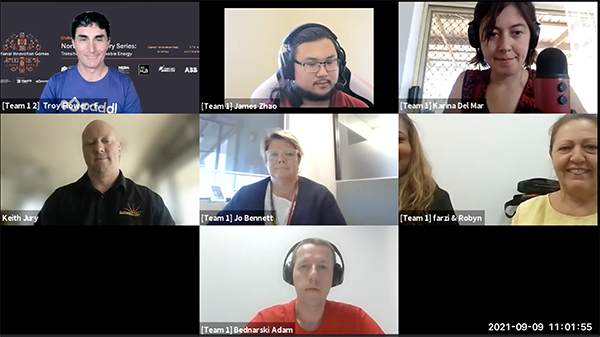
Local businesses, organisations, industry leaders and students have embraced the Northern Territory National Innovation Games to develop solutions for businesses to transition to renewable energy.
For the third and final games, 170 participants came together online and in-person at the Darwin Innovation Hub, forming 16 teams and representing a range of industries, including health, property, construction, mining and resources, tourism and hospitality.
The solutions developed will enable businesses to uncover and harness opportunities in renewable energy from the perspective of suppliers, employers, educators, service providers and product developers.
“The interest and participation in these Games highlights the growing desire of Territory businesses looking to transition into renewable energy, engaging their teams to become educated in the process as well as working collectively to develop sustainable solutions.”
- Emma Nesbitt, DIH Chief Operating Officer and Chair of the Territory Hydrogen Technology Cluster
Winning solutions
First place: 'Prana Power'
The winning solution for the third challenge was conceived and developed by team 'Prana Power', which included Calvary Community Care Bathurst Island Australian Regional and Remote Community Services, Palmerston Regional Hospital Community Care and Darwin Solar.
The team designed a pilot program using renewable energy in homes to increase the health and wellbeing of people living in remote Aboriginal communities. The pilot program, called 'Sun Healing Homes' would also include a nutritional health education program.
The team identified that a consistent and affordable power supply in remote communities plus an education program would reduce the impact of food wastage, increase the awareness around how to eat healthy using electrical appliances. It also aims to help reduce the number of people with preventable chronic illness due to inadequate nutrition. The solution does not require the grid to operate, is scalable, applicable to remote and regional communities nationally and globally, and would deliver knowledge transfer to local areas, including training for installation and maintenance.
Second place: 'The Sparkies'
The team designed an internship program, 'Solar Boots on the Ground', that brings together key stakeholders to address a significant hurdle in the uptake of renewable energy resulting from the lack of talent and technical skills to support the implementation.
The proposed solution would create a skilled workforce to implement and maintain solar installations in remote communities.
Third place: 'H2Ocean'
The team focused on fuel consumption and transition in the use of maritime vessels in and out of Darwin. The fuel used for these vessels is currently diesel, the alternative to diesel is LNG and Hydrogen. The economics of 100% conversion to green hydrogen was deemed cost prohibitive to a solution as it required two elements (i) infrastructure to deliver the fuel and (ii) engine conversion on the vessels.
The solution proposed was an incremental conversion of maritime vessels from diesel power to 100% renewable energy. The team identified that the preferred path for conversion was to convert to a dual-fuel gas with hydrogen blend and then to a full hydrogen conversion.
Stay up to date with news on Territory Energy Innovation and Renewables by joining our mailing list.
